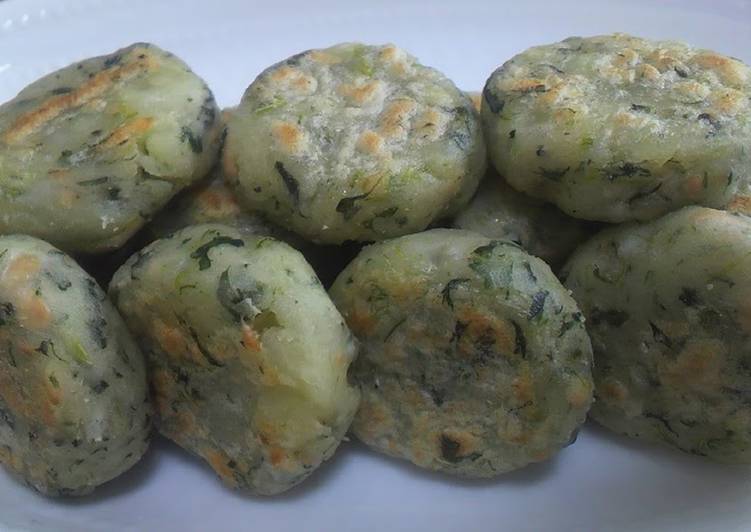Potato, Shirasu, & Natto Oyaki for Infants (9-11 mos). You can use vegetables other than spinach. These may also taste good with sesame seeds or hijiki seaweed. When thawing, soak them in water briefly to give them a springy texture.
 These may also taste good with sesame seeds or hijiki seaweed.
Finely chop the shiso leaves and mix thoroughly with the shirasu, tofu, and potato starch.
Divide into four equal parts and shape into patties.
You can cook Potato, Shirasu, & Natto Oyaki for Infants (9-11 mos) using 5 ingredients and 6 steps. Here is how you achieve that.
These may also taste good with sesame seeds or hijiki seaweed.
Finely chop the shiso leaves and mix thoroughly with the shirasu, tofu, and potato starch.
Divide into four equal parts and shape into patties.
You can cook Potato, Shirasu, & Natto Oyaki for Infants (9-11 mos) using 5 ingredients and 6 steps. Here is how you achieve that.
Ingredients of Potato, Shirasu, & Natto Oyaki for Infants (9-11 mos)
- Prepare 5 small of Potatoes.
- You need 3 tbsp of Shirasu (boiled and dried baby sardines).
- Prepare 3 tbsp of Spinach.
- You need 1 of pack Split bean natto.
- You need 3 tbsp of Katakuriko.
Grill both sides in a pan with salad oil till browned. Pour ponzu and sprinkle ichimi red pepper, as desired. Quick Stir Fried Takuan with Chirimen Recipe. Furikake Shirasu is a seasoning by Marumiya.
Potato, Shirasu, & Natto Oyaki for Infants (9-11 mos) step by step
- Cut the potato into small pieces and soak in water before boiling..
- Pour boiling water over the shirasu to remove the salt..
- Also pour hot water over the natto to get rid of the stickiness..
- Parboil the spinach and mince..
- Combine everything together..
- Form small balls, and pan-fry in the frying pan until browned (over medium-low heat)..
It is based on sardine and seaweed mixed with condiments to flavour or complement foods. The larvae are shirasu and made into Tatami iwashi; chikuwa; himono (non-salted dried fish) - some products are bone dry and stiff, incl. ei-hire (skate fins), surume (dried squid), but often refer to fish still supple and succulent. kamaboko, satsuma age, etc., comprise a class of food called nerimono, and are listed under surimi products. niboshi How Oyaki Are Cooked. Oyaki were traditionally cooked and charred in the ash of an open fire in an irori (囲炉裏) hearth. These days, oyaki at specialty stores are typically roasted on an iron pan, then either steamed or broiled before enjoying piping hot. Such young fish often travel together in schools along the coast, and move into estuaries and sometimes up rivers where they can be easily caught with fine meshed fishing nets.